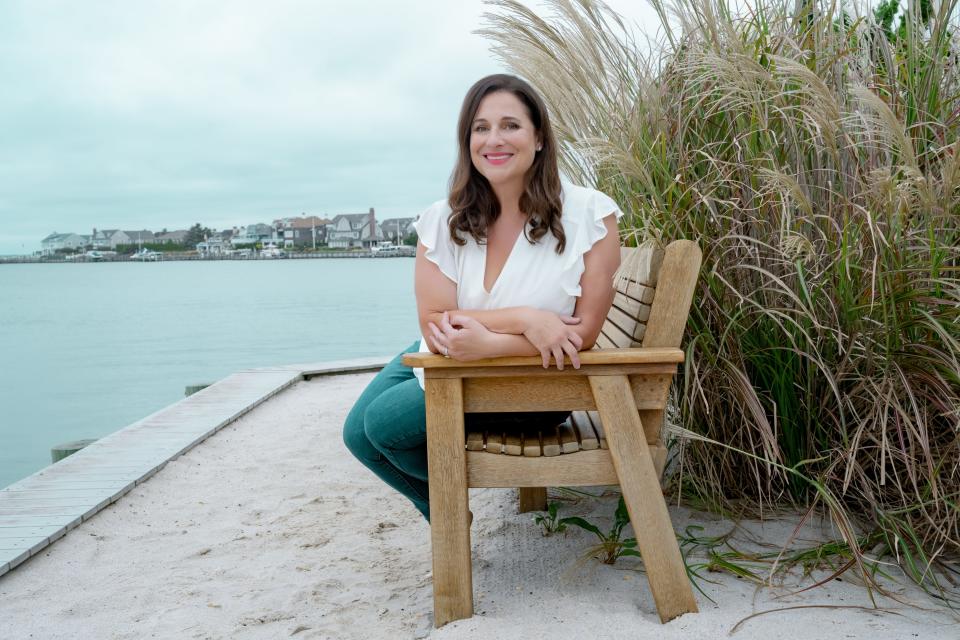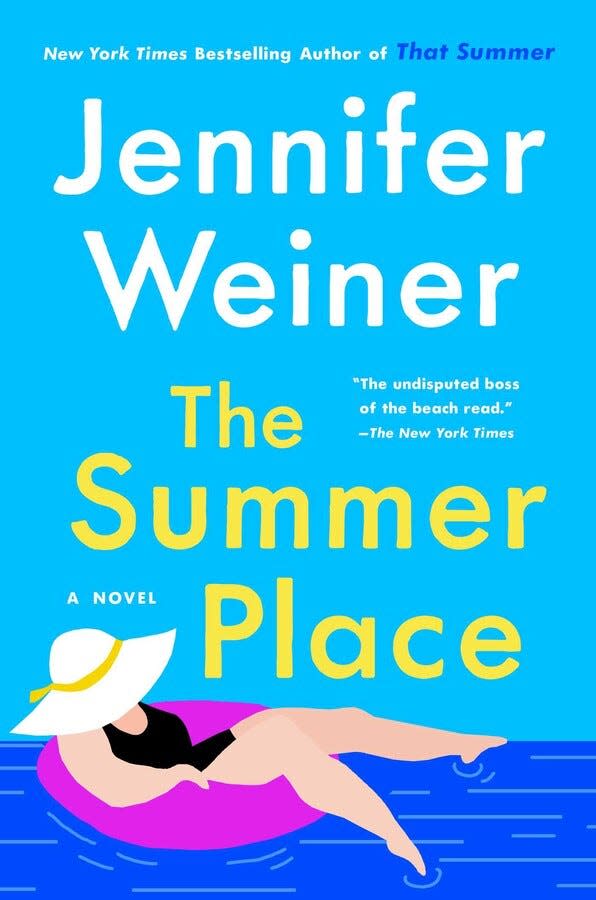What makes a beach read? Pleasure, says author Jennifer Weiner, and we need more of it
Once upon a time, when I was young and innocent, working as a newspaper reporter in Philadelphia and writing a novel in my spare time, I believed that what I was writing was simply a book, or a novel, or a piece of fiction. I thought if I were ever lucky enough to get it published, that’s what people would call it.
Like I said, I was young. And innocent. "Good in Bed," my first book, was the story about a plus-size girl who survives a breakup and public humiliation, picks up the pieces of her life and figures out who she is. It was the book that saved my life, the book I needed to read as a young woman and had to write instead.
A book can be the truest story of your heart. It can be everything you believe or hope or long for, pulled out of your heart and put on the page. It can be your lifeline, the thing that saves you, or that holds up a mirror to other readers and lets them feel seen. It can be all of those things.
Sexy summer read: Jennifer Weiner's 'Big Summer' is a delight

But if you’re fortunate enough to actually get it published, that book is also going to be a commodity, available for purchase in outlets nationwide. It’s going to be packaged. It’s going to be branded and labeled. And, if you’re a young (or young-ish) woman, if your book has a female protagonist or a breezy tone, if it deals with families and romance, and especially if it’s published in the spring, it’s probably going to be called a beach read.
I’ll be honest: For years, I despised the term. Maybe my books weren’t "literary," but they weren’t just disposable fluff, either. They were women’s stories, and as a culture we still seem wedded to the idea that stories by and about women are of less consequence than stories by and about men. It was hard not to notice that I saw plenty of Stephen King and John Grisham on the beach, but nobody called those books "beach reads." They got to be "mysteries thrillers" or even simply "books."
Finally, the beach is, as far as I’m concerned, the worst place in the world for reading anything. Too much sun, too much glare, too much sand in the wrong places. And if you’re a mother, you’re going to get distracted every time a kid yells “Mommy!” And there’s always a kid yelling "Mommy!"
'Fifty Shades of Grey' at 10: E L James reflects on 'Twilight' fan fiction, the haters and Christian and Ana's future
Then, in 2019, I made a choice. I decided that if I couldn’t beat the term, I could embrace it. I could, as they say, steer into the skid. I could wrap my arms around the parts of the label I liked, rejecting the rest. So I set out to write a trilogy of quintessential beach reads, which began with thinking about what, exactly, makes a book a beach read.
Answering this question wasn’t as easy as I thought it would be. Like Supreme Court Justice Potter Stewart trying to define hardcore pornography in 1964, I know it when I see it. There’s usually a certain lightness to the tone, a quality of escapism, fantasy or whimsy to the plot. The locale can be exotic, with heroes and heroines who roam the world before ending up in one another’s arms; or it can be as cozy and familiar as the house you grew up in; or it can be the ramshackle mansion by the sea you wish you’d grown up in. A happy ending – or at least a mostly happy ending – is the only non-negotiable. If there are wedding vows, babies or even a bittersweet farewell in the book's final pages, that might be a beach read. If the characters keep plodding along with their academic jobs and unhappy marriages, that’s probably literary fiction.

Setting felt important. I’ve spent years of summers on the Outer Cape, so I decided to set my beach books there. I could write about the gorgeous beaches, the golden dunes braceleted in sea grass and tangles of beach plums and rose hips; the silky warm water in the freshwater ponds and the bracing cold of the ocean; the briny succulence of the oysters; the gritty weight of wet sand.
Romance seemed essential, so I gave my characters love stories, even if the course of true love rarely runs smoothly. (If it did, they’d be very short books!) Families always come with complications and drama, so I could add that. I could address the issues that were on my own mind.
"Big Summer" dealt with social media and the multiple versions of ourselves that online life requires. "That Summer" took on #MeToo, how no woman escapes trauma, whether quotidian or life-rupturing, and how all of us are shaped by it. "The Summer Place" is about three generations of a family and its secrets, and what it’s like to be middle-aged, with elderly or dying parents and children who turned into young adults during the pandemic. It’s also about parenting and step-parenting and whether every woman wants to be a mother, and what happens when a woman steps off of that path.
Jackie Collins: Queen of trash or empowering feminist icon? Why not both
All three books feature the kinds of heroines I love best, flawed and funny, insecure and striving, women who make mistakes and get knocked down, but get up again and try to do better. I stirred in friends and dogs, and moonlit kisses, added (mostly) happy endings, and voila: beach reads.
By the end of the project, I realized that, to me, "beach read" had just come to mean a book I enjoy.
Which leads me to the conclusion that a beach book is, above all, about pleasure; that, just like any body on a beach is a beach body, any book on the beach is a beach book. And I’ve got plenty to recommend!
If you love twisty thrillers with unreliable narrators, John Searles’ "Her Last Affair" will keep you guessing – and turning the pages. If you’re into creepy gothics with a feminist twist, Sarai Walker’s "The Cherry Robbers," the story of an artist who grew up in a wedding-cake of a house with seven cursed sisters and a madwoman for a mother, is beach-y perfection. Scorching love story set in the steamy tropics about a young woman grappling with grief, making sense of her life and her ambitions, and yearning for a man she shouldn’t want? Akwaeke Emezi’s "You Made a Fool of Death With Your Beauty" (out May 24) will have you asking, "Is it hot in here, or is it just this book?" If you want to shiver instead of sweat, Meg Elison's "Number One Fan" (out Aug. 30) is a reinvention of Stephen King’s "Misery." The writer’s a woman, her captor’s a creepy dude, but the essential questions – Who owns a story? What do writers owe their fans? – remain the same. If you yearn for a beachy setting, pick up one of Jamie Brenner’s Cape Cod-set books ("The Husband Hour" and "The Forever Summer" are my favorites) or Elin Hilderbrand’s Nantucket novels (her latest, "The Hotel Nantucket," is out June 14, and personally, I’ll forever adore "The Blue Bistro").
If your summer reading goal is to escape your own family drama by immersing yourself in a different family’s dysfunction, Grant Ginder’s twisty, darkly comic "Let's Not Do That Again," about an ambitious politician, her wayward daughter and her steadfast son, will take you far, far away from whatever plane or beach or road trip your summer plans entail. If you’re looking for story that takes on element of the #MeToo movement, Jillian Medoff’s "When We Were Bright and Beautiful" (out Aug. 2) is two parts "Gone Girl," two parts "Notes on a Scandal," and will play with your expectations about who’s the villain and who’s the victim. And if you want your heart broken open, Neel Patel’s "Tell Me How to Be," about an immigrant mother still longing for the man she left behind, and her mostly closeted son still struggling with his own desires, is perfection.
Sometimes, the best beach reads are the familiar ones. Susan Isaacs' "Shining Through," about a secretary hopelessly in love with her upper-crust boss who becomes a spy in World War II Germany, is the perfect book to read anywhere, beach included, and Diana Gabaldon’s "Outlander" series, with its ravishing romance and its immersive world-building, could keep you happily engrossed all summer long.
At the end of the long, languid days, summer is about pleasure, and beach reads are meant to be whatever stories you find most enjoyable. So put on the SPF, get someone else to make sure the kids don’t drown, and enjoy.
This article originally appeared on USA TODAY: Jennifer Weiner: Summer reads are about pleasure no matter the genre

 Yahoo Movies
Yahoo Movies 
